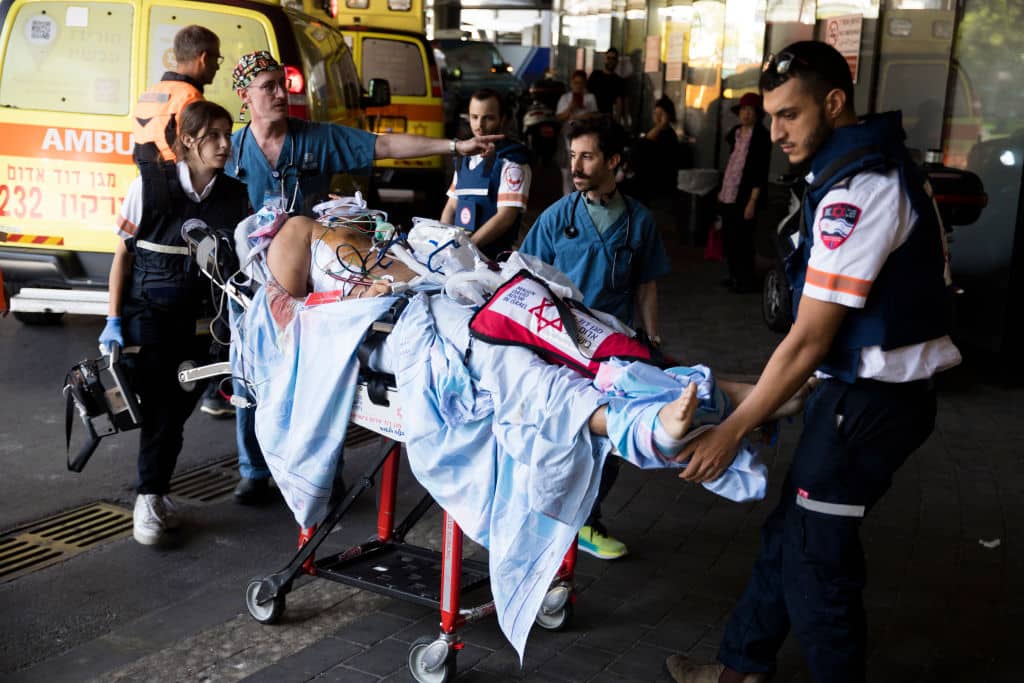 TEL AVIV, ISRAEL – OCTOBER 7: An injured soldier is brought into Tel Aviv’s Surasky Medical Center in Tel Aviv on October 7, 2023 in Tel Aviv, Israel. Photo by Amir Levy/Getty Images
TEL AVIV, ISRAEL – OCTOBER 7: An injured soldier is brought into Tel Aviv’s Surasky Medical Center in Tel Aviv on October 7, 2023 in Tel Aviv, Israel. Photo by Amir Levy/Getty Images On Saturday morning, Israel woke up to the harshest terror incursion in the country’s history. Hundreds of Hamas gunmen from the Gaza Strip overwhelmed the border by land, sea, and air, attacking Israel’s civilian communities, where they indiscriminately killed or wounded soldiers and civilians alike.
The Israeli government has reported over 700 dead and more than 2000 injured, including women, children, and the elderly. Scores of Israelis were kidnapped and moved inside the Gaza Strip, though no official number has been reported yet.
The Israeli army arrived at the sites of incursion a few hours later and fought the terrorists for several hours, eventually announcing that it killed over 200 gunmen and regained most of the captured territory. Those civilians who managed to reach bomb shelters and saferooms, where they locked themselves inside, were stuck there for several hours with no way to communicate with the outside, no electricity, and in many cases, no food and water.
Dozens of terrorists also reached a major rave party taking place at Kibbutz Reim next to the border with Gaza, where they shot and killed many of the partygoers, injuring and kidnapping others. Participants who managed to run away from the danger stayed hidden and unable to communicate with their families, creating uncertainty and chaos within many Israeli homes.
Simultaneously, some 3,000 rockets were fired from Gaza into the neighboring Israeli communities and cities in central Israel, including Tel Aviv and Jerusalem.
Prime Minister Benjamin Netanyahu has since declared war and vowed to retaliate with all the nation’s might. Until now, Israeli airstrikes have leveled areas of Gaza, hitting hundreds of targets. Tens of thousands of Israeli army reservists have been called up, reinforcing the belief that a ground invasion will likely follow.
On Saturday evening, while Israelis from the South were still dealing with terrorist infiltrations in their communities, residents and tourists in central Israel were rushing to bomb shelters, seeking protection from repeated rocket barrages raining down on the country.
Kovie Adar, a tourist from New York who is in Israel visiting his family for the holidays, told The Media Line about his experience during the last 24 hours. Adar was in a neighborhood in Givatayim, in central Israel, where one of the Hamas missiles hit.
“We were in the bomb shelter. It’s an older building and does not have a saferoom, so we went to the bomb shelter, and it was really loud, like a sonic boom, really scary, oh my God,” he said.
Robert Owen, a tourist from London, was also close to a rocket that landed in the heart of Tel Aviv. “Last night was the worst time; we went down into the shelter from the hotel, and as we were coming down, I heard a pretty loud bang, which I realize now was a hit on the building around the corner, which was quite scary,” he told The Media Line.
After a day of missile attacks and much uncertainty, people in Israel are trying to cope with the unprecedented situation.
Meira Erez, a Tel Aviv resident and shop owner, told The Media Line that the events of the last day reminded her of the Yom Kippur War, which was also a surprise war that started exactly 50 years ago.
“It’s difficult, it’s a very difficult feeling. We never had such a situation like this. Fifty years after the Yom Kippur, and now it’s Simchat Torah. It’s awful,” she said.
Adar compared what he is living with the events of 9/11. “I was in New York on 9/11; I lived in Manhattan at the time, far from the towers, but that was the closest thing I have ever experienced to this,” said Adar.
Tom Bitton is a resident of Tel Aviv and, together with his wife, owns one of the shops in central Tel Aviv that was hit by a rocket.
“I’m the owner of this business, JusterArium,” Bitton told The Media Line. “Yesterday, some of the neighbors told us that the store was hit, and we saw that everything was broken here. We saw that the building was hit by a rocket, and we came back this morning to try to take what we could and what we hoped would be good.”
Rachel Adar, an Israeli expat living in New York, says that this situation has no precedent. “I don’t remember anything like this, never ever. I’ve been through the Six-Day War … but it was nothing like this. It was quite scary,” she told The Media Line.
People in Israel are in acute shock over what they just lived through during the last day and a half.
“Such a massive attack from the air, from the sea, from everywhere; in parachutes, they came. I don’t think anybody could have imagined it,” said Erez.
Poaz Wang, a tourist from Taiwan, told The Media Line that he was visiting Israel for pleasure and also for business and that he had never been in such a situation. He was scared because his hotel was very close to where the rocket hit in Tel Aviv on Saturday night. “I cannot imagine something like this happening in my country,” he added.
The streets of Tel Aviv are normally packed with residents and tourists but now cafés are serving few patrons as a palpable fear lingers.
However, despite the fear, The Media Line found in the heart of Tel Aviv a large pop-up network of volunteers who were collecting and packing donations for soldiers and civilians.
Shahar Agami, one of the volunteers and a resident of Tel Aviv, said that the rockets were the least of their worries. Their first priority is helping the soldiers who are defending the country and the residents of southern Israel who were affected by the terrorist incursion.
“What is more important for us is our soldiers; they are fighting, and we are very worried,” she told The Media Line.
Agami described how the massive donation initiative in central Tel Aviv started spontaneously through social media groups.
“We had this WhatsApp group, and many people who were part of other WhatsApp and Facebook groups noticed that there was a collection point to buy, organize, and bring food to soldiers as well as to the civilians in the South who need new things after their houses were ruined, broken, and burned. Everything is spontaneous here,” she said.
To read more stories from The Media Line, click here.























 More news and opinions than at a Shabbat dinner, right in your inbox.
More news and opinions than at a Shabbat dinner, right in your inbox.